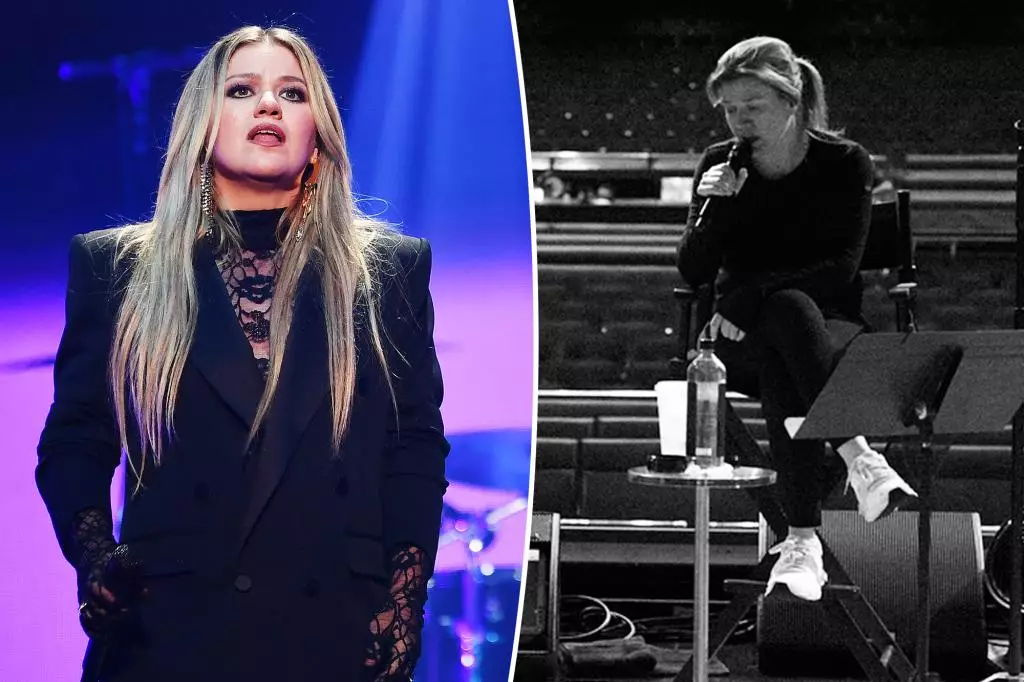The abrupt cancellation of Kelly Clarkson’s Las Vegas residency has laid bare the often-overlooked human element behind the glitz and glamour of celebrity performances. Her team, a dedicated group of professionals who invest countless hours preparing for every show, were blindsided by the sudden decision. The disorganization and lack of prior communication reflect a broader issue within the entertainment industry: the fragile trust and respect owed to those working tirelessly behind the scenes. Clarkson’s last-minute cancellation not only undermined her reputation among her crew but also highlighted how superficial the celebrity-fan relationship can become when health or personal struggles are concealed until the eleventh hour.
The fact that many employees learned of the cancellation through social media rather than from Clarkson herself is telling. This impersonal approach emphasizes a disconnect between the artist and her team that is symptomatic of a celebrity-driven culture obsessed with image over authentic communication. When integrity is compromised, the ripple effects are felt far beyond the stage — fans feel betrayed, workers feel unvalued, and the overall atmosphere turns tense and distrustful. Clarkson’s decision, though perhaps motivated by genuine health concerns, was executed in a way that felt dismissive and disrespectful to those relying on her to fulfill their livelihoods.
The Human Cost: Fans and Their Unmet Expectations
The emotional toll on fans who arrived hours early, only to be met with disappointment, reveals a deeper issue about the authenticity of celebrity commitments. Many fans, some flying in from overseas, had invested large sums of money, time, and hope into experiencing Clarkson’s performance. The heartbreak expressed in tearful reactions outside Caesars Palace was not just about missed entertainment — it was about unmet expectations from someone they admire and trust. The sense of betrayal was compounded by the fact that many had no prior notice, and learned of the cancellation moments before the show was supposed to begin.
This incident underscores a broader pattern of celebrities sometimes prioritizing their personal boundaries or health concerns over transparency. While health issues are valid reasons for cancellation, the manner in which these are communicated matters profoundly. Failing to provide timely, honest updates diminishes fans’ trust and diminishes the community that forms around live performances. Clarkson’s situation illustrates how fragile this trust can be in an era where social media acts as the primary information conduit, often cutting out the human element in favor of instant, impersonal updates.
Health, Voice, and the Reality of High-Pressure Careers
The official reason—vocal exhaustion—though understandable, raises questions about the sustainability of a career built on such high demands on voice and mental fortitude. Clarkson, known for her powerhouse vocals, is clearly aware of her limits, having previously come close to needing vocal surgery. Her candid admission about the toll her profession takes on her health reflects a deeper struggle many performers face: balancing their craft’s physical demands with personal well-being.
What remains disturbingly under-discussed is how the relentless pressure to deliver perfection can compromise not only an artist’s health but also their emotional stability. Clarkson’s openness about her personal battles, including her divorce and ongoing struggles, offers a rare glimpse into the often-hidden cost of fame. These vulnerabilities, however, seem to be ignored when decisions are made hastily, and stress is prioritized over sustainable work practices. The industry needs a more compassionate approach to artist health, fostering environments where performers like Clarkson can prioritize their well-being without fear of appearing unreliable or unprofessional.
The Broader Implications: Respect and Responsibility in Celebrity Culture
Clarkson’s recent saga is more than just a personal misstep; it’s a mirror reflecting the darker realities of modern celebrity culture. The obsession with maintaining a flawless image can often lead to neglecting genuine human needs and relationships. Fans, crew members, and even artists themselves are collateral damage in the relentless pursuit of perfection and entertainment.
This incident should serve as a wake-up call for those in the industry: Authenticity, transparency, and respect are the pillars that sustain long-term trust and success. Clarkson’s situation exposes a failure on many levels — communication, empathy, and responsibility. It also challenges us as consumers of entertainment to demand more genuine interactions and to recognize the human behind the celebrity persona. Ultimately, true respect in the entertainment industry will require acknowledging vulnerability and fostering an environment where artists feel safe to prioritise their health without fear of stigma or backlash.

Leave a Reply